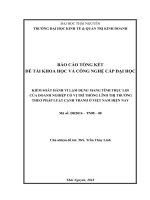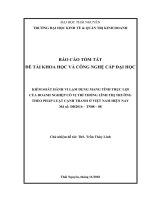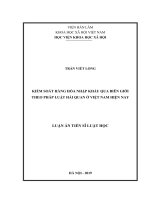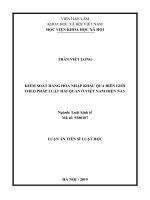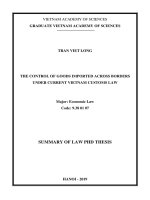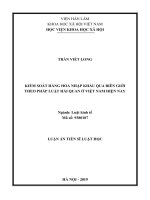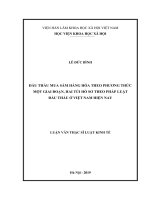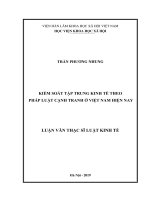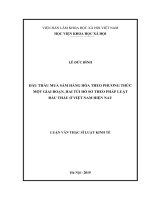Kiểm soát hàng hóa nhập khẩu qua biên giới theo pháp luật hải quan ở việt nam hiện nay tt tiếng anh
Bạn đang xem bản rút gọn của tài liệu. Xem và tải ngay bản đầy đủ của tài liệu tại đây (364.52 KB, 27 trang )
VIETNAM ACADEMY OF SCIENCES
GRADUATE VIETNAM ACADEMY OF SCIENCES
TRAN VIET LONG
THE CONTROL OF GOODS IMPORTED ACROSS BORDERS
UNDER CURRENT VIETNAM CUSTOMS LAW
Major: Economic Law
Code: 9.38 01 07
SUMMARY OF LAW PHD THESIS
HANOI - 2019
The work was completed at
GRADUATE ACADEMY OF SOCIAL SCIENCES
Scientific Supervisor: Assoc. Prof. Dr. Nguyen Thi Thuong Huyen
Reviewer 1: Assoc. Prof. Dr. Tang Van Nghia
Reviewer 2: Assoc. Prof. Dr. Duong Dang Hue
Reviewer 3: Assoc. Prof. Dr. Le Thi Thu Thuy
The dissertation will be defended before the thesis review
council of the Academy at the Graduate Academy of Social Sciences
at
hour minute, day month year.
The thesis can be found at:
- National Library of Vietnam
- Library of Graduate Academy of Social Sciences.
INTRODUCTION
1. The urgency of the topic
In the trend of globalization, trade among countries around the world has
been strongly established through the entry and signing of international treaties
on trade. In Vietnam, trade cooperation has brought great benefits to the
national economic development, especially after WTO accession, trade
relations have recorded impressive and economic "milestones". There are many
outstanding changes, contributing to promoting the construction and
development of the country. Cross-border imported and exported goods have
specific regulations, especially the control of goods imported across borders
under the customs law has positive impacts on the economy, meeting the
requirements on integration, effective support in the implementation of the
Party's and state's policies on customs, ensuring the practicality of the
inspection, supervision, inspection and handling of violations of import and
export laws password; Limiting acts of commercial fraud, investment, national
economic security protection, effective implementation of commitments to
trade and customs in international treaties to which Vietnam is a party. The
process of customs reform has also built up a customs force with a high level,
professionalism, depth, investment in modern technical equipment.
However, controlling goods imported across borders under customs law
also has shown some inadequacies in the legal perspective and implementation.
Henceforth, it need to be improved; in other words, improving efficiency is an
urgent requirement.
Given this situation, the current requirement in Vietnam is to study scientific
theoretical issues, analyze and objectively assess the legal situation and organize
implementation to propose viewpoints and solutions to improving the effectiveness
of border imports under the systematic, standard and compatible customs
legislation with international legal systems to meet the requirements set forth in the
current globalization trend. As results from the above explanations, the author
chooses the topic "The control of goods imported across borders under current
Vietnam customs law" to make a doctoral dissertation.
2. Dissertation research tasks and objectives
2.1. Objectives
The objectives of the dissertation is giving legal and practical scientific
arguments to objectively assess the situation of controlling imported exported
goods to propose viewpoints and solutions to improve the control efficiency of
1
imported goods under the current customs law in Vietnam based on theoretical
research on controlling imported goods across borders.
.2.2. Tasks
Firstly, clarifying the theoretical issues on controlling imported goods
across borders;
Secondly, analyzing and assessing the practice of controlling imported
goods across borders under the current Vietnam Customs law;
Thirdly, giving opinions and proposing feasible and effective solutions
to improve the control efficiency of goods imported across borders under the
current Vietnam Customs Law in coming time.
3. Subjects and scope of research
3.1. Subject
The research subject of the dissertation is the theoretical issues, the
status of controlling cross-border imported goods, views and solutions to
improve the control efficiency of imported goods across borders under the
Customs law in Vietnam.
3.2. Scope of research
- The dissertation studies the contents of controlling imported goods across
borders according to customs law in terms of theory and practice. The dissertation
focuses on researching content related to controlling goods names, goods codes,
quantity, quality, origin, customs value and enforcement of intellectual property
rights for imported goods across borders according to customs law. The issues of
specialized professions only mention a certain level in the process of implementing
the main content that the dissertation researches.
- The dissertation focuses on researching the control of imported goods
across borders under the customs law in Vietnam from 2005 up to now.
4. Rationale and research methods
4.1. Rationale
The dissertation is studied based on the views and worldview of
Marxism - Leninism, the thoughts of President Ho Chi Minh on the orientation
and solutions to improving the legal regulations on market economy and the
role of the government in a market economy, and economic integration.
4.2. Research Methods
In addition to the traditional method of dialectical materialism and
historical materialism, the dissertation uses common research methods of social
science and legal science: analytical methods, synthetic methods, statistical
2
methods, comparative legal learning methods, methods of information
collection and information processing. The dissertation is carried out in a legal
and customs specialized approach, interdisciplinary and multidisciplinary
approach in scientific research.
5. Research Contributions
Firstly, the dissertation systemeticalizes and provides further
clarification on the scientific basis of controlling goods imported across borders
under the customs law through specific issues such as clarifying the content of
controlling import goods across the border according to the law. The basics of
the necessity of controlling cross-border imports to provide effective control
requirements for imported goods; analyzes and clarifies theoretical issues about
scope, subjects and objects of controlling imported goods across borders in
order to assess its role.
Secondly, the dissertation clarifies the law on the control of imported
goods across borders under the customs law, assesses and analyzes the status of
controlling imported goods across borders in accordance with the customs law
in Vietnam which is currently quite adequate and systematic. Thereby, there are
certain shortcomings in terms of law and organization to control imported
goods across borders under the current Vietnamese customs law.
Thirdly, the dissertation has given a consistent and systematic point of
view; proposed a number of solutions in order to improve the efficiency of
controlling imported goods across Vietnam's borders on the basis of ensuring
the principle of state management, meeting the requirements in line with the
foreign trade management policy. Proposals for groups of solutions to improve
the control of imported goods across borders that the dissertation has not yet
been published in other scientific research projects.
6. The theoretical and practical significance of the dissertation
The dissertation introduces the concept and scientific legal issues, which
can suggest important contents for competent agencies to control imported
goods across borders under the customs law.
The dissertation suggests theoretical and practical issues posed in the
context of improving competitiveness, promoting trade liberalization in
Vietnam today for goods imported across borders.
The dissertation is also useful documents and materials for training in
customs and commercial training and retraining institutions related to the
purchase and sale of goods or management policies for relevant fields.
3
7. Structure of the dissertation
In addition to the introduction, conclusion and list of references, the
dissertation is divided into 4 specific chapters as follows:
Chapter 1: Overview of research situation and issues related to the
dissertation topic
Chapter 2: Rationale for controlling cross-border imports according to
customs law
Chapter 3: Practice of controlling imported goods across borders under
Vietnamese customs laws today
Chapter 4: Solutions to improving the control efficiency of imported
goods across borders under Vietnamese customs law
Chapter 1
OVERVIEW OF RESEARCH SITUATION AND ISSUES RELATED TO
THE DISSERTATION TOPIC
1.1. Overview of research situation
1.1.1. The situation of theoretical research on control of imported
goods across borders
1.1.2. The situation of studying the scientific basis of adjusting the law
on the control of imported goods across borders and the current status of the
law on control of imported goods across borders
1.1.3. Practice of research on solutions to control imported goods
across borders and perfect laws, mechanisms and policies on controlling
imported goods across borders
1.2. Overall evaluation of research projects related to the
dissertation topic
1.2.1. On reasoning
The authors have a general overview of customs and legal issues related
to operations, functions, roles, supervision, inspection and control activities of
customs authorities, post-clearance inspection, domestic and international ecustoms... On the basis of approaching theoretical issues, assessing and analyzing
the contents in the above works, the authors have taken a multi-dimensional
approach, according to each field, according to the specific method.
1.2.2. On practice
Many scientific topics and works have been implemented, practical
implementation of customs law, especially the application of electronic
customs, customs management, risk management. The projects have evaluated
4
those specific activities, issues problems, limitations in legal regulations and
the status of implementation of customs laws such as consistency and
compatibility of customs legal documents with other legal systems, current
status of mechanisms, policies and customs procedures; practice of law
enforcement from customs authorities and management agencies. These works
are useful, have a reciprocal relationship and help graduate students approach
the knowledge of the dissertation being implemented. However, most of the
research topics focused on the content related to statistics, analysis of the
situation of import and export of goods in Vietnam, research and statistics on
smuggling and illegal transportation of goods, dealing with intellectual
property violations, post-customs clearance inspection, customs inspection
without having generalized systematic practical issues on the control of
imported goods across borders according to specific customs laws in the
current situation. Therefore, it is necessary to inherit the research works on the
status of the law and the practice of controlling cross-border import and export
goods under the Customs law, which is the work that needs to be further
studied in the dissertation "The control of imported goods across borders under
Vietnam current customs laws”.
1.2.3 On solutions
The scientific research works that the author has been approached mainly
propose solutions in terms of state management process of implementing the
customs law on control of imported and exported goods and solutions given mainly
from the institutional and mechanism perspective. The basic solutions are in line
with the essential requirements in the context of international economic integration
in Vietnam today. They have been given towards multidimensional research with
effective effects in customs reform process in terms of law as well as
implementation mechanism, solutions to improving enforcement in the trend of
trade integration; topics, despite the expected international economic integration
conditions. Through the study of the above projects, the PhD student can draw a lot
of valuable lessons and experiences to effectively implement the dissertation, give
practical views and solutions suitable to the commercial conditions of international
trade in our country today.
1.3. The contents of the dissertation need to continue research
1.3.1. On reasoning
Controlling imported goods across borders is a new research content, so
it is necessary to clarify theoretical issues with rigorous scientific arguments. It
5
is the study and approach to the concept of controlling imported goods across
borders to provide appropriate views and solutions to meet the national trade
integration and international links. The dissertation will also analyze the
contents of the inevitability, scope, subjects, objects, and role of controlling
goods imported across borders in a systematic and well-grounded manner. On
the other hand, building requirements to control imported goods across borders
to be complete from a legal and practical perspective; analyze the contents of
controlling goods imported across borders according to law and factors
affecting the control of imported goods across borders.
1.3.2. On practice
On the basis of continuing to inherit the researches of the authors, the
dissertation will concretize studies on the status of controlling imported goods
across borders under the customs law in Vietnam in the perspective of legal
status. laws on the control imported goods such as: control of good name,
product code, quantity, quality, origin, customs value, systematic and
synchronous enforcement of intellectual property rights. At the same time, the
dissertation analyzes control methods for goods imported across borders.
The dissertation clarifies the causes of limitations and exists when
controlling imported goods across borders under the current Vietnamese
customs law. Thereby, analysis on a number of issues posed for the control of
imported goods across borders in Vietnam will be presented.
1.3.3. Perspectives and solutions to improve the control efficiency of
imported goods across borders under the customs law in Vietnam
The dissertation identifies the viewpoint of perfecting the control of goods
imported across borders under the customs law in Vietnam, which is associated
with the policies and guidelines of the Party and the state in the process of trade
development in general and trade international trade in particular.
On the basis of the comprehensive views, the dissertation offers
solutions to improving the control efficiency of goods imported across borders
under the customs law in accordance with the requirements of management and
control of current import and export trade, which is harmonious and compatible
with international standards of customs.
1.4. Basis of research theory
In the dissertation, the author has used a number of research theoretical
bases: the theory of the role of the state; Theory of economic management;
Theory of inspection and control; Theory of risks in commercial activities and
6
risk management in international trade activities; Theory of domestic trade
protection such as protection and protection against international integration;
Market theory on commodity policies, competition policies, consumer rights
protection; Theory of international trade; Theory of intellectual property.
Chapter 1 conclusion
The dissertation confirms the urgency of studying the rationale for
controlling cross-border imports which has been analyzed through the factors
affecting the awareness, the reality of law and practice in the process of
controlling imports across borders. The dissertation has analyzed the research
situation according to the problem groups, namely: The situation of theoretical
research on the control of imported goods across borders; The situation of
studying the scientific basis of adjusting the law to control imported goods
across borders; Situation of studying the status of controlling imported goods
across borders and the reality of the law on controlling imported goods across
borders and the situation of studying solutions to controlling imported goods
across borders and perfecting laws, mechanisms and policies on controlling
imported goods across borders. The public ensures the basic requirements of
management and control requirements for import and export goods in terms of
approach according to the research object of the topic. However, the general
studies have not yet specialized in controlling goods imported across the border
in terms of jurisprudence, mainly the authors study under the system of
economic science and management science. Therefore, the dissertation
continues to study in terms of theory, aspect of the legal situation and the
reality of law implementation, giving opinions and some solutions to improve
the control efficiency of imported goods across borders. gender.
The dissertation has given the theoretical basis for research in
accordance with the requirements of controlling imported goods across borders.
Accordingly, some theories used in the dissertation relate to state management
on trade.
Chapter 2
RATIONALE FOR CONTROLLING CROSS-BORDER
IMPORTS ACCORDING TO CUSTOMS LAW
2.1. Basic theoretical issues about controlling imports across borders
2.1.1. Concept of controlling imported goods across borders
2.1.1.1. Concept of imported goods across borders
7
Cross-border imported goods are commercial activities whereby goods are
moved into customs territory of another country, controlled by customs authorities
and authorities in a uniform order and procedure under the state regulations..
2.1.1.2. Concept of controlling imported goods across borders
Control of cross-border imports are activities that include professional
activities such as inspections, monitoring, inspections and other activities to
review, monitor and evaluate cross-border delivery of goods. Thereby,
solutions to limiting commercial frauds will be brought forward.
2.1.2. Scope, subjects and objects of control of goods imported across
borders
2.1.2.1. Scope of control of goods imported across borders
2.1.2.2 Subjects and objects of control of goods imported across borders
- Subject of control
- About the subject being controlled
- Control object
2.1.3. Request for control of goods imported across borders
Firstly, control of imported goods across borders must be
comprehensive
Secondly, controlling imported goods across borders ensures
consistency and practicality
Third, control of cross-border imports ensures transparency
Fourth, controlling imported goods across borders to ensure
harmonization of domestic economic policies and export and import policies.
2.1.4. The role of controlling imported goods across borders
First, control of imported goods across borders represents a directing
role in trade policy, strengthening trade relations with imported foreign
elements in the trend of globalization.
Secondly, control of imported goods across borders creates
transparency for state management of import and export, establishing fairness
for enterprises, promoting law compliance of enterprises. in the process of
implementing import goods business.
Third, controlling imported goods across borders is a basis for
agencies to control functions to enhance the effectiveness of coordination and
improve the quality of staff.
8
Fourthly, controlling imported goods across borders is a basis for
assessing goods quality, intellectual property rights and commodity policies for
imported goods to ensure consumers' rights.
2.1.5. Factors affecting control of imported goods across borders
2.1.5.1. Legal regulation
2.1.5.2. Management apparatus and human resources control
2.1.5.3. Coordination mechanism in controlling goods imported across
borders
2.1.5.4. Legal compliance of enterprises
2.1.5.5. Science and technology and information technology
application
2.1.5.6. The trend of trade liberalization and international cooperation
on customs
2.2. Controlling goods imported across borders under the customs law
2.2.1. The objective need of controlling imported goods under
customs law
- Firstly, customs law determines subjects, objects and scope of control
of goods imported across borders.
- Secondly, customs law establishes obligations and rights of parties to
control imports across borders.
- Thirdly, the customs law regulates the content and method as well as
the process of controlling goods imported across borders.
2.2.2. Contents of controlling goods imported across borders under
the customs law
2.2.2.1. Control of goods names and import goods codes
- Control of goods names
Firstly, ensure the adjustment of laws and management policies in the
implementation of border control of imported goods.
Secondly, control of imported goods names across the border helps the
state to review the system of imported goods for the item management policy.
Thirdly, controlling the name of imported goods across borders creates
transparency and fairness for enterprises, building trust for the merchant
community.
Contents of controlling cross-border imports ensure the basic
requirements:
9
Firstly, clearly and fully describe the composition, content, nature,
structure, characteristics and utility, which meet the criteria for the name and
description of goods in the list of exported and imported goods. password
Secondly, compare the names of declared goods with the contents of
explanations of sections, chapters, sub-chapters, related groups and categories
in the list of imported goods; technical documents and other documents related
to goods at customs dossiers.
Third, the process of controlling the name of goods must be carried out
regularly, continuously with strict processes and operations.
Fourthly, controlling the names of imported goods across borders must
ensure the convenience for enterprises to enforce customs laws, create
conditions for quick control to facilitate enterprises to well observe and handle
business efficiency career violation.
- Control of goods codes
Control of imported goods codes includes the content, method and
legal measures for commercial activities of enterprises in order to implement
legal provisions in accordance with the import regulations of the countries. to
monitor, check and inspect the implementation of import laws of enterprises
and other entities when conducting cross-border trade activities.
2.2.2.2. The control of the quantity and quality of imported goods
- Control of quantity
Controlling the amount of imported goods across borders is a method
and method that can summarize the actual number of goods imported by
enterprises into the national territory in order to implement the provisions of
law customs and other laws to assess compliance with regulations on tax
policy, control of product origin and legal compliance of enterprises in the
import of goods.
Control methods:
+ Control via information on customs declaration
+ Control on the basis of determining the actual quantity
+ Control by way of customs supervision
- Quality control
Quality control of imported goods across borders includes review and
monitoring activities such as inspection, supervision, monitoring, handling of
violations and other activities for cross-border imported goods related to
characteristics of products and goods, eliminating risks and wrongdoing of
10
subjects in the management, organization and implementation of legal
provisions on quality of goods imported across borders according to a certain
standard or criterion published by the enterprise or according to the standards
set by the importing country.
2.2.2.3. Control the origin of imported goods across borders
The control of cross-border imports of goods includes the activity of
controlling the basic criteria on information of certification of origin of goods
in conformity with the contents on certificates of origin of goods and
documents of customs documents such as bills of lading, commercial contracts,
commercial invoices or documents prescribed by national laws for goods that
carry out import procedures across borders.
Specific role for controlling the origin of imported goods:
Firstly, controlling the origin of imported goods across borders is a basis
for determining the origin of goods, how to calculate import tax.
Secondly, controlling the origin of imported goods across the border is
useful for statistics of foreign trade activities;
Thirdly, controlling the origin of imported goods across the border in
order to enhance the prestige and responsibility of enterprises when supplying
goods to markets, customers and the location of exporting countries.
Fourth, controlling the origin of cross-border imports of goods to
implement trade defense instruments such as anti-dumping taxes,
countervailing duties, trade defense measures.
2.2.2.4. The control of import customs value
The control of customs value of imported goods across the border is a
regular activity of the customs office in determining the accuracy of the value
of imported goods provided by the enterprise or other entities carrying out
customs procedures. to implement the management of state policies on taxes
and other import regulations according to the law for goods imported across
borders according to the provisions of law.
Contents of customs valuation inspection:
- Check the value declaration
- Checking the value at the customs office
- Checking the value at the import establishment
- Consult customs valuation
2.2.2.5. Enforcement of intellectual property rights of goods imported
across borders
11
Control of intellectual property rights on cross-border imports is the
operation of the customs authorities and the functional forces granted by the
state to exercise the contents in accordance with the law to determine
compliance. Intellectual property laws and violations of entities conducting
trade in goods imported across borders.
Measures to control intellectual property rights across borders:
- Suspension of customs clearance:
- Check and supervise to detect violations:
2.2.3. Methods of controlling cross-border imports under customs law
2.2.3.1. Customs Inspection
Under the Customs Law 2014: "Customs inspection is the inspection of
customs dossiers and actual inspection of goods and transport means performed
by customs authorities".
The main contents of customs inspection include:
First, check the legal status of the customs declarant
Secondly, check the completeness, legality and validity of the customs
dossier set
Third, check the actual collation of goods and attached documents
Fourth, check the law enforcement process of goods owners
2.2.3.2. Customs supervision
Customs supervision is a professional measure applied by customs
authorities to ensure the status of goods, the compliance with the provisions of
law in the preservation, storage, loading, transportation, use goods, exit, entry,
transit means of transport are subject to customs management [Clause 5,
Article 4, Customs Law 2014].
Customs supervision aims at the following basic objectives:
Firstly, to ensure the integrity of imported goods.
Secondly, the way for the state to control imported goods in addition to
other methods, determine compliance with customs law.
Thirdly, customs supervision of imports across borders is also a way
for the state to review trade policies.
2.2.3.3. Other customs control
Some other control methods such as: Customs patrol; Customs
investigation and other professional measures (such as Investigation measures
to study the situation; Collection measures; Secret base measures; Offline
12
reconnaissance measures; Technical reconnaissance measures; Bien France to
fight specialized projects ...
The contents of these control methods include:
Firstly, organizing activities of collecting, analyzing and processing
customs professional information, serving modern customs management.
Secondly, proactively detect, prevent and prevent smuggling or illegal
transport of goods across borders.
Thirdly, investigate and handle customs law violations.
Fourthly, international customs cooperation.
Chapter 2 Conclusion
Chapter 2 of the dissertation clarifies issues such as the concept, the
necessity of controlling imported goods across borders, subjects, objects, scope,
roles, requirements and objective necessity of the control of goods imported
across borders in accordance with the customs law.
It also analyzes the factors affecting the control of imported goods
across borders such as legal factors, the trend of trade liberalization and
international cooperation on customs, science and technology applications.
information technology application, practice of complying with laws of
enterprises, customs apparatus and human resources, assignment and
coordination of authority among control agencies.
The chapter clarifies the issues of controlling cross-border imports
according to the customs law on the contents of the border control goods import
legislation, including control of goods names, goods codes, quantity, quality,
origin, customs valuation and enforcement of border intellectual property rights of
the control of imported goods. The dissertation also mentions the methods of
controlling cross-border imports under customs laws such as customs inspection,
customs supervision and other control methods. The content and control methods
are recognized and approached according to the linkage requirements in
management science, legal science on international trade and customs.
Chapter 3
PRACTICE OF CONTROLLING IMPORTED GOODS ACROSS
BORDERS UNDER VIETNAMESE CUSTOMS LAWS TODAY
3.1. The practice of Vietnamese customs regulations on the control
of imported goods across borders
3.1.1. General provisions on controlling imported goods across the
border of Vietnamese customs law
13
Firstly, on the principle of carrying out customs procedures, customs
inspection and supervision
Secondly, on customs modernization in control of imported goods
across borders
Thirdly, on the Customs duty in controlling imports across borders
Fourthly, on cooperation and coordination in controlling goods
imported across borders
Fifth, dealing with the results of controlling import goods across
borders
Sixthly, on the right to complaints and grievances related to the control
of goods imported across borders
Seventhly, on international cooperation in controlling imports across
borders
3.1.2. Current status of regulations on control of imported goods
across the border of Vietnamese customs law
3.1.2.1. Regulations on customs inspection
3.1.2.2. Regulations on customs supervision
3.1.2.3. Regulations on customs control
3.1.3. Regulations on the control of imported goods across the border
in Vietnamese customs law
3.1.3.1. Regulations on contents of inspection of imported goods and
goods codes
3.1.3.2. Regulations on the content of inspecting the quantity and quality
of imported goods
3.1.3.3. Regulations on the content of customs valuation of imported
goods
3.1.3.4. Provisions on contents of checking imported goods origin
3.1.3.5. Provisions on content enforcement of intellectual property rights
at the border for imported goods
3.1.4. Some shortcomings and limitations of Vietnam's customs
legislation on the control of imported goods across borders
First, the customs law regulating the control of imported goods across
borders still does not ensure the synchronous and harmonized factor with
international law.
Firstly, the connotation of the concept of customs control has not met
the standards under the revised Kyoto Convention
14
Secondly, the regulations on geographical areas to control imported
goods across borders are not compatible with the Kyoto Convention
Second, the law governing regulations on control of goods imported
across borders under the Customs law is still inadequate
Firstly, the customs law on origin control makes it difficult for customs
authorities to determine violations and handle violations.
Secondly, inadequacies in regulations related to customs valuation
Third, inadequate in the provisions of law relating to the enforcement
of intellectual property rights
3.2. Practical implementation of the control of imported goods
across the border under Vietnamese customs law
3.2.1. Practical control of imported goods and goods codes
3.2.1.1 The control of goods names
Controlling the name of goods imported across borders under the
customs law is prescribed through such methods as customs inspection,
customs supervision and customs control, inspection and handling of violations
in the field of customs. The process of controlling imported goods names which
has been actively coordinated between customs authorities and specialized
control units, administrative management units have created favorable
conditions for the import of goods of enterprise.
Some specific shortcomings:
Firstly, the circumstances that enterprises do not declare or
misrepresent their names in the list of goods imported into Vietnam still exists
Secondly, enterprises take advantage of the inadequacies in the
regulation of checking goods names to carry out the act of declaring goods
wrongly compared to the actual import.
Thirdly, enterprises take advantage of the diversity of imported goods
across borders without declaring goods names when importing
3.2.1.2. Control of goods codes
Vietnam's customs law regulates commodity codes that basically meet
the general provisions of the world customs law, creating compatibility in
managing import and export goods across borders.
However, there are some shortcomings, the following exist:
Firstly, there is still a situation of inconsistency in the application of
taxable goods to import enterprises.
15
Secondly, the implementation of a number of legal regulations on
goods codes of enterprises is vague, ineffective due to inaccurate regulations,
the process is uncertain
Thirdly, enterprises declare the criteria for customs authorities to
determine that the code is still incomplete, making it difficult to identify
imported goods.
Fourthly, there is a situation where enterprises take advantage of
preferential policies and laws on imported goods in order to commit illegal acts.
Fifthly, a number of customs officers and business officials carrying
out import and export operations do not know clearly the regulations and legal
procedures for goods codes.
3.2.2. Practical control of quantity and quality of imported goods
3.2.2.1.The control of quantity
Customs authorities and functional units have timely grasped, effectively
implemented and well implemented the requirements of controlling the number
of imported goods in a timely manner to prevent and detect many infringed
shipments such as importers incorrectly declare the quantity, the difference
between the actual imported goods and the information on the customs
declaration. The enterprise has been aware of compliance with the law on the
implementation of the provisions of customs law and commercial law when
declaring the quantity of goods.
3.2.2.2. Quality control of imported goods
Quality control of goods imported across borders under Vietnamese
customs law has basically completed such as the Law on Product Quality
Goods, the Law on Standards, technical regulations and basic guiding
documents among The Ministry of Trade and Industry has had a synchronous
and coordinated work of interest in implementing product quality management
legislation.
Some shortcomings still arise such as:
Firstly, overlapping the authority to control the quality of imported
goods across borders
Secondly, the regulation of time for goods quality inspection still lasts
Thirdly, the proportion of goods subject to specialized inspection is still
high, affecting the import-export business environment, causing inadequacies
in customs clearance time, adversely affecting business psychology.
16
Fourthly, controlling imported goods is still limited in terms of people
and means of control.
3.2.3. Practical control of origin of import goods
The legal provisions on goods origin have been specific, adjusted
accordingly and meet the management criteria as well as domestic trade
policies and international trade policies.
Some shortcomings exist:
Firstly, false declaration of origin of goods
Secondly, there is a situation where enterprises take advantage of import
and export preferential policies to misrepresent the type of imported goods.
Thirdly, the phenomenon of fraud and counterfeiting on origin
declaration is still popular
Fourthly, the situation of enterprises taking advantage of preferential
policies and favorable mechanisms for importing finished goods into Vietnam
to carry out procedures to grant certificates of origin in Vietnam to illegally
benefit.
3.2.4. Practical control of customs value for imported goods
Implementing the law on customs valuation of goods imported across
borders in Vietnam has had positive effects, the awareness of enterprises has
been enhanced, enterprises have basically complied with the requirements of
control of goods imported across borders. Customs forces control customs
values with high expertise and effective coordination during the operation.
Control of customs value has raised the sense of law compliance.
The control of customs value of goods imported across borders in
Vietnam is limited:
Firstly, the value check is still ineffective, omitting many cases of lower
declared values than identical goods, similar to the price database system.
Secondly, post-clearance inspection is not really effective
Thirdly, some businesses are not knowledgeable about customs
valuation method, so their awareness of rights and obligations is limited.
3.2.5. Practical implementation of intellectual property rights of
goods imported across borders
Some achievements:
Firstly, it has formed a specialized department to act as a focal point,
advising on intellectual property at customs at all levels and organizing basic
and intensive training for staff.
17
Secondly, customs authorities have worked closely with state
management agencies on intellectual property, organizations and the business
community.
Thirdly, strengthening international exchange and cooperation in order
to attract resources for the control of intellectual property rights protection.
Some shortcomings exist in the following:
Firstly, the behavior of enterprises is not declared on the trademark
customs declaration of imported goods when transported across the border
Secondly, the detection and handling of infringing goods on IP rights
carried out by customs authorities through the application of inspection and
supervision measures and customs control measures are only carried out on the
establishment has a claim of the right holder or there is a doubtful indication of
counterfeit goods, infringement of IP rights, a temporary suspension of customs
procedures, and the right of the owner to file a temporary request stopping
customs procedures must pay a certain amount of security.
3.3. Causes of limitations, shortcomings and some problems posed
through practical control of imported goods across borders under the
current Vietnam Customs Law
3.3.1. Causes of limitations, exist
3.3.1.1. Objective reasons
3.3.1.2. Subjective reasons
3.3.2. Some issues raised from the current practice of controlling
cross-border imports in Vietnam
Firstly, the scope of content and methods of controlling goods
imported across borders under the customs law in Vietnam is still too general.
Secondly, the control of goods imported across borders under the
customs law in Vietnam still exists locally, sporadically and not synchronously.
Thirdly, compliance control through risk management is a positive
control model.
Fourthly, for each method of controlling cross-border imports, it
should be simple, efficient, practical and strict.
Fifthly, on the modernization of customs inspection and supervision
equipment for goods imported across borders
Sixthly, about applying audit skills in KTSTQ
Seventh, overlap in specialized management / inspection of ministries
and branches:
18
Eightly, about the legal compliance situation of enterprises operating
export and import.
Chapter 3 Conclusion
Chapter 3 of the dissertation has clarified important issues related
to the practice of Vietnam's customs regulations on the control of imported
goods across borders and implementing the contents of controlling imported
good across borders under Vietnamese customs law. Chapter 3 mentiones a
number of shortcomings and limitations of Vietnam's customs legislation on
the control of imported goods across borders and problems raised from the
actual control of imported goods in Vietnam. now on
Chapter 3 of the dissertation clarifies the general provisions on
control of imported goods across the border of Vietnam customs law,
regulations on control of imported goods across the border of Vietnamese
customs law. Moreover, it also mentions inadequacies of laws regulating origin
control, customs valuation, enforcement of intellectual property rights ... for
goods imported across borders.
In practice, the implementation of the content of controlling goods
imported across borders under the Vietnamese Customs Law, Chapter 3 of the
dissertation has approached according to the content of the law on controlling
goods names, goods codes, quantity and quality, origin, customs valuation and
enforcement of border intellectual property rights. Thereby analyzing a number
of existences when the entities implement the above provisions in accordance
with the customs law.
Chapter 3 of the dissertation has also given and analyzed the causes
of existence including objective causes and subjective causes and some
problems posed when controlling imported goods across borders under
Vietnamese customs law. Male today. In the practical implementation of
control over imported goods, there are still shortcomings in objective and
subjective aspects, causing difficulties in the implementation process.
Chapter 4
SOLUTIONS TO IMPROVING THE CONTROL EFFICIENCY OF
IMPORTED GOODS ACROSS BORDERS UNDER VIETNAMESE
CUSTOMS LAW
4.1. The viewpoint of improving the efficiency of controlling crossborder imports in Vietnam today
19
First, controlling goods imported across borders under the customs law
in Vietnam ensures the points of view and policies of the Party and the state in
managing the import of goods.
Second, controlling goods imported across borders under the customs
law in Vietnam must ensure the efficiency of implementing laws and legal
policies on imported goods.
Third, controlling imported goods across borders in Vietnam ensures
the principle of uniformity, overcoming the overlap of control over imported
goods across borders.
Fourth, controlling goods imported across borders under customs law
must be consistent with administrative reform requirements in customs.
4.2. Solutions to improve the efficiency of controlling imported
goods across borders under Vietnamese customs law
4.2.1. Amend and supplement some concepts in accordance with
Kyoto Convention
Firstly, the uniform and compatible regulation of the concept of
customs control in the Kyoto Convention on simplicity and harmonization of
customs procedures and Customs Law 2014 Vietnam.
Secondly, uniformly regulate the geographical areas of control of
goods imported across borders compatible with the Kyoto Convention.4.2.2.
Nâng cao hiệu quả về kiểm soát tên hàng, mã hàng hóa nhập khẩu
4.2.2.1. Improve the efficiency of commodity name control
First, overcome the wrong declaration of imported goods
Second, promote the determination of details of goods, regulations that
are legally binding on the criteria for managing goods in the detailed list of
national databases. Enhance regulations and build integrated customs
information on commodity names.
Third, legal sanctions are more likely for violating enterprises to
declare names of goods imported across borders in order to limit trade frauds.
Fourth, promoting the application of modern commodity name control
methods, limiting the direct impact on imported goods to reduce the time to
control the name. Issue and unify the data system of list of goods names and
priority enterprises to import across borders.
4.2.2.2. Improve the efficiency of product code control
First, unify to effectively implement regulations on commodity codes in
accordance with the current provisions of Article 28 of the Law on Customs 2014.
20
Second, implement a strict sample analysis process at reputable
establishments of customs units and specialized inspection units.
Third, take imported goods at risk of being taken advantage of to
divide shipments into the list of need-to-review to avoid regulations on tax
policies and commodity policies for goods imported across borders. .
Fourth, provide details of customs regulations on goods codes and
regulations on codes to be imported across borders. Integrate goods information
and update the list of imported goods to ensure interoperability. Identify goods
with high import values.
4.2.3. Improve the efficiency of controlling the quantity and quality
of imported goods
4.2.3.1. Improve the efficiency of controlling the quantity of goods
Firstly, boost control and proper application of law and strengthen
sanctions for enterprises violating and fraudulently declaring the quantity of
imported goods.
Secondly, build a quantity control method applying customs risk
management.
Thirdly, strengthen the sanctions system for violations of declaration,
counterfeiting or other acts related to the quantity of imported goods.
4.2.3.2. Improve the efficiency of goods quality control
First, promote quality control of imported goods
Second, research and consolidate legal documents in controlling the
quality of imported goods across borders to avoid overlapping regulations and
practical tasks. It is necessary to perform well the specialized inspection role
under the authority according to the Product Quality Law.
Third, issue procedures for receiving and announcing conformity with
goods imported across borders
Fourth, strengthen the application of regulations on risk management
in quality control of imported goods.
Fifth, carry out an international agreement on "mutual recognition" of
goods quality control.
4.2.4. Improving the effectiveness of controlling imported goods origin
Firstly, unify regulations on how to record the origin of imported
goods to determine violations and handle violations for controlling cross-border
imports.
21
Secondly, overcome violations when declaring rules of origin of
imported goods such as soliciting origin from specialized units, using
information of commercial counselors, Vietnam embassy offices in supplying
countries.
Thirdly, clearly specify criteria related to imported goods with large
import turnover, quantitative and specific methods of determination. Adopt
specific provisions for cases of increasing customs value.
Fourthly, specify the automatic identification of origin
Fifthly, the customs agency performing the control task must apply a
scientific and accurate basis to different inspection and control establishments
such as considering raw materials constituting goods products.
4.2.5. Improve the efficiency of customs valuation control
Firstly, set uniform rules and purposes for customs valuation
Secondly, supplement the terms of consultation on customs value
Thirdly, unify and apply regulations on the principle of fixing tax rates
in case of not clarifying the question on customs value when consulting
Fourthly, study and make clear legal provisions on goods with large
import turnover according to a specific quantity or criterion.
Fifth, about regulations related to the price database of customs.
4.2.6. Improve the efficiency of intellectual property rights
enforcement
Firstly, it is clear, in particular, that there is no application for
suspension of customs procedures.
Secondly, regulate the role of customs in the case of carrying out the
task of controlling imported goods across borders without the application as
stipulated in Clause 2, Article 73 of the Customs Law 2014.
Thirdly, the law should stipulate the process of handling specific
customs sanctioning competence under the regulations on functions and
competence.
Fourthly, the customs law requires that all businesses declare and
register for protection of intellectual property rights for goods they produce.
Fifthly, customs law needs to provide specific limits on the inspection
of goods suspected of violating intellectual property rights.
4.3. Some other solutions
4.3.1. Strengthen organizational structure, human resource
organization and coordination mechanism in controlling imported goods
22
4.3.2. Enhance the application of modern control methods and
applying modern operations in controlling imported goods
4.3.3. Improve the quality of investment in facilities and modern
equipment for controlling goods imported across borders
4.3.4. Enhance the effectiveness and efficiency of risk management
and compliance management in the control of imported goods across borders
4.3.5. Diversify and improve the quality of propaganda, dissemination
and support legislation on control of imported goods across borders
4.3.6. Promote international cooperation in controlling goods imported
across borders
Chapter 4 Conclusion
Firstly, there are some viewpoints on solutions to improve the control
efficiency of imported goods across borders under the customs law in Vietnam
from the institutional and policy perspectives of the Party and the state;
ensuring harmonization of domestic trade and international trade. The process
of building and perfecting the customs law on the control of imported goods
across borders must ensure consistency, integration and high feasibility when
implementing and legalizing international law commitments in which Vietnam
is a member;
Secondly, the dissertation offers solutions to improve the control
efficiency of goods imported across borders under the customs law in the
current situation, which is the amendment and supplement of the conceptual
content in customs law in accordance with international legal standards
stipulated in the Kyoto Convention on simplicity and harmonization of customs
procedures.
CONCLUSION
1. Control of goods imported across borders under the customs law is a
particular activity in international trade activities. The research, reference
works and this paper have provided basic overviews of legal issues and
implementation of customs laws such as inspection, supervision, prevention of
smuggling, handling of violations ... in the system of tax, customs, trade,
foreign trade management regulations ... The dissertation has studied the
contents of the theoretical and practical perspectives of controlling goods
imported across borders under the law on customs.
2. This dissertation also develops the content of the argument on
controlling imported goods across borders which demonstrate an important role
23
